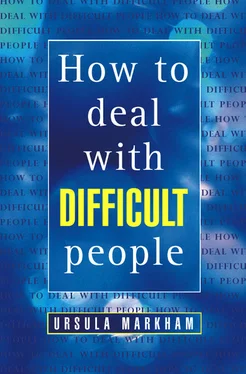Ursula Markham - How to Deal With Difficult People
Здесь есть возможность читать онлайн «Ursula Markham - How to Deal With Difficult People» — ознакомительный отрывок электронной книги совершенно бесплатно, а после прочтения отрывка купить полную версию. В некоторых случаях можно слушать аудио, скачать через торрент в формате fb2 и присутствует краткое содержание. ISBN: , Жанр: unrecognised, на английском языке. Описание произведения, (предисловие) а так же отзывы посетителей доступны на портале библиотеки ЛибКат.
- Название:How to Deal With Difficult People
- Автор:
- Жанр:
- Год:неизвестен
- ISBN:978-0-00-738171-5
- Рейтинг книги:4 / 5. Голосов: 1
-
Избранное:Добавить в избранное
- Отзывы:
-
Ваша оценка:
- 80
- 1
- 2
- 3
- 4
- 5
How to Deal With Difficult People: краткое содержание, описание и аннотация
Предлагаем к чтению аннотацию, описание, краткое содержание или предисловие (зависит от того, что написал сам автор книги «How to Deal With Difficult People»). Если вы не нашли необходимую информацию о книге — напишите в комментариях, мы постараемся отыскать её.
A concise, straightforward book on how to handle difficult people in your personal or professional life.
How to Deal With Difficult People — читать онлайн ознакомительный отрывок
Ниже представлен текст книги, разбитый по страницам. Система сохранения места последней прочитанной страницы, позволяет с удобством читать онлайн бесплатно книгу «How to Deal With Difficult People», без необходимости каждый раз заново искать на чём Вы остановились. Поставьте закладку, и сможете в любой момент перейти на страницу, на которой закончили чтение.
Интервал:
Закладка:
What change do I intend to make?
What are the problems I may encounter?
What will be the positive benefits?
When am I going to begin?
Communication
An assertive person is a good communicator. Because he recognizes the importance of the other person’s opinion, he is a good listener. This involves understanding not only what is said but also all non-verbal communication (body language). He is able to begin conversations and to sustain them, speaking calmly and saying what he truly feels.
Because communication is so vital, it is important to realize that ‘small talk’ has its place, too. We do not have to spend our entire lives discussing matters of earth-shaking significance. More trivial chat about the weather, holidays or what the children are doing is a means of forging a link between ourselves and others. People who are unable to communicate on such a level tend only to be able to ‘talk at’ rather than ‘talk to’ others. And, since no one really wants to be lectured continuously, resentment may soon grow on the part of the listener.
Negotiation
The ability to negotiate is an essential part of the assertive person’s repertoire. If this were a perfect world and everyone in it an assertive person, negotiating and compromise would be far more common.
In order to negotiate in any situation it is necessary to understand the other person. After all, he has a right to his opinion just as much as you have a right to yours. If there is a clear indication of his feelings, show him that you are aware of it. You might say something like, ‘I can see that this is worrying you’ or ‘I understand your point of view’. If you are at all unsure of what his position is or how he feels, don’t be afraid to ask for an explanation.
Whatever happens, and even if the other person loses his temper or becomes overemotional, you must remain calm. If you feel yourself growing tense, concentrate on relaxing your muscles – particularly those around your shoulders and jaw where tension is quick to build up. Breathe deeply and steadily; this will help you to remain in control.
If you are going to negotiate you need to do so from a position of strength, so be sure that you are armed with whatever facts are necessary to back your point of view. And keep to the topic under discussion without allowing superfluous opinions or accusations to enter into the conversation. If the other person wanders off the point, gently but firmly bring him back to it.
Eventually you may reach the stage where you feel it is appropriate to propose a compromise. This is not the same thing as capitulating or acting in a submissive way. There is little point in being stubborn just for the sake of it and you will probably find it easier than you think to reach a solution that satisfies both parties without either of you feeling that you have been forced to give in against your will.
Handling Put-downs
Unfortunately there are people who delight in making others feel small. While they should not be allowed to get away with it, an aggressive reaction will simply instigate an argument which may become heated. A submissive reaction will achieve nothing at all except possibly to cause the perpetrator to feel that he has scored a victory. Either of these responses will have the added negative effect of causing you to be annoyed with yourself afterwards.
If you come into contact with someone who enjoys delivering a good put-down, try to see the hidden inference behind his words. If he says to you, ‘Haven’t you done that yet?’ what he is really saying is ‘You’re incompetent.’ Unless you know that you really are at fault and have failed to do something you promised to do, a possible assertive response would be ‘Not yet. When did you want it done?’
If you are aware of put-downs and recognize them for what they are – a form of bullying where the aggressor is seeking to inflate his own ego by making you feel inferior – you are less likely to fall into this trap. If you have succumbed in the past, think about it now and decide how you would react should the situation present itself again.
Dealing with Criticism
No one really likes to be criticized. An assertive person, however, will realize that criticism falls into two categories:
Unfair: If criticism is unfair, it is unimportant and you should not pay any attention to it.
Fair and constructive: If the criticism is justified, although you still may not like to hear it, in the long term it can prove to be useful and positive.
Reacting aggressively to criticism causes problems of its own. If you snap back at the critic you will probably start an argument. If you are not assertive, you will not win the argument and you will end up feeling bad about it.
If you react submissively to criticism and always agree with the critic, whether or not he is being fair and just, you are simply pushing yourself lower and lower in his estimation – and in your own. Eventually you will reach the stage where you never do anything at all in case it attracts criticism from others. There are three main techniques for dealing with criticism:
If the criticism is fair – agree with whatever is justified (although not with that which is simply judgemental) and say what you intend to do about it:‘It was your turn to do the washing-up this morning and it’s still there in the sink [criticism]; you’re absolutely hopeless [judgement]’.‘Yes, it was my turn. I’ll do it right now.’This is not a submissive response because the criticism is a fair one. You did promise to do the washing up and you failed to do so. Your reply will serve to show the critic that you acknowledge the fault and intend to put things right. This will take the wind out of his sails and a possible argument will be avoided.
If the criticism has an underlying truth but is exaggerated – accept that which is justified but do not react in any way to the exaggeration:‘You were supposed to have that report on my desk by 9 this morning and you still haven’t finished it. You just don’t care. Everyone else always ends up doing your work.’ (The only true part of this criticism is likely to be the first sentence.)‘Yes, I am late submitting the report and I’m sorry about that. I’ll work through my coffee break and get it to you at the first possible moment.’By staying calm and responding only to the true part of the criticism, you remain in control of the situation. The critic will be appeased by your offer to go out of your way to put the matter right and, because you have not risen to the bait and responded aggressively to the unjust part of the criticism, an argument is less likely to ensue.
Responding with a question – this is a particularly useful response when someone is making a criticism of you personally as opposed to your work.‘You wouldn’t understand.’‘Why do you think I wouldn’t understand?’The critic’s reply to your question will help you to decide whether he is genuinely concerned about you – in which case he will go on to explain his comment – or is simply being unpleasant – in which case he is likely to begin to bluster, having nothing specific with which to back up his statement. Then you will know that he is not really worth bothering about and his remarks will cease to distress you.
Preparation
Suppose you have to find an assertive way of persuading someone to do something. Many people find this difficult, particularly if there is an implied or actual criticism of the other person for poor performance to date. There are four points you need to cover and, bearing these in mind, it is often helpful to prepare a script in advance to ensure that each step is taken in turn. Naturally you do not need to read the script out when you come to talk to this person, but it will help you to fix in your mind what you intend to say. The four steps are:
Читать дальшеИнтервал:
Закладка:
Похожие книги на «How to Deal With Difficult People»
Представляем Вашему вниманию похожие книги на «How to Deal With Difficult People» списком для выбора. Мы отобрали схожую по названию и смыслу литературу в надежде предоставить читателям больше вариантов отыскать новые, интересные, ещё непрочитанные произведения.
Обсуждение, отзывы о книге «How to Deal With Difficult People» и просто собственные мнения читателей. Оставьте ваши комментарии, напишите, что Вы думаете о произведении, его смысле или главных героях. Укажите что конкретно понравилось, а что нет, и почему Вы так считаете.












